- Home
- Linda Castillo
Fallen Page 2
Fallen Read online
Page 2
“Ten-four.”
I’m no stranger to violence or the unspeakable things human beings are capable of doing to each other. Even so, for an instant I can’t catch my breath.
The woman’s head is turned away from me, her chin tilted at an unnatural angle. I see strawberry-blond hair matted with blood, the scalp laid open, a small red mouth at the back of her head. Green-blue fingernail polish. Gold bracelet. Pretty hands. And I’m reminded that just hours ago, this woman cared about such mundane things as a manicure and jewelry.
Careful not to disturb the scene, I sidle around to the other side of the woman. I know immediately she’s dead. The left side of her face has been destroyed. Cheekbone caved in. Eyeball dislodged from its socket. Nose an unrecognizable flap of skin. Tongue protruding through broken teeth. A string of blood and drool dribbling onto the carpet to form a puddle the size of a fist.
I shift the beam of my flashlight to her face. Recognition flickers uneasily in my gut, the stir of some long-forgotten memory. A punch of dread follows, because at that moment I do not want to know her. But I do and the rush of nausea that follows sends me back a step.
Bending, I put my hands on my knees, and blow out a breath. “Damn.”
I choke out a sound I don’t recognize, end it with a cough. Giving myself a quick mental shake, I straighten, look around the room. A high-end purse with leather fringe has been tossed haphazardly onto the chair. An overnight bag sits on the floor in front of the cubbyhole closet. I go to the chair, pluck a pen from my pocket, and use it to flip open the flap. Inside, I see a leather wallet, a cosmetic case, a comb, perfume. I pull out the wallet. I notice several twenty-dollar bills as I open it and I know that whoever did this didn’t do it for money.
Her driver’s license stares at me from its clear-faced pocket. The floor tilts beneath my feet when I see the name. Rachael Schwartz. The dread bubbling inside me burgeons as I stare down at the photo of the pretty young woman with strawberry-blond hair and her trademark almost-smile. It’s the kind of smile that shouts I’m going places and if you can’t keep up you will be left behind! But then that was Rachael. Hard to handle. High emotion and higher drama. Even as a kid, she was prone to making mistakes and then defending her position even when she was wrong, which was often. If you hurt her or angered her, she lashed out with inordinate ferocity. Faults aside, her love was fierce and pure. I know all of those things because I was one of the few Amish who understood her, though I never said as much aloud.
Closing my eyes, I bank the rise of emotion, shove it back into its hole. “Son of a bitch,” I whisper.
I knew Rachael Schwartz since she was in diapers. She was seven years younger than me, the middle child of a Swartzentruber family here in Painters Mill. The Swartzentruber sect is an Old Order subgroup and its members adhere to the timeworn traditions in the strictest sense. They eschew much of the technology other sects allow, such as the use of gravel for long lanes, indoor plumbing, and even the use of a slow-moving-vehicle sign for their buggies. The Schwartzes had five kids and I babysat them a few times when I was a teenager. Her mamm and datt still live in the old farmhouse off of Hogpath Road.
I lost track of Rachael over the years. I heard she left Painters Mill at some point, before I returned here as chief. She was the only girl I’d ever met who was worse at being Amish than me.
Using my cell, I snap a photo of the license in case I need to reference the information later.
“Chief?”
I startle, turn to face Mona, hoping my face doesn’t reflect the riot of emotions banging around inside me. “You get the crime scene tape up?” I ask.
“Yes, ma’am.” Something flickers in her eyes. She cocks her head. “You know her?”
I sigh, shake my head. “Not well, but…” I don’t know how to finish the sentence, so I let the words trail off.
Mona gives me a moment; then her gaze flicks to the purse. “Anything?”
“Driver’s license. Cash.” I acknowledge the thought that’s been nudging at the back of my mind. “No cell phone. Have you seen one?”
“No.”
I use the pen to go through the scant items inside, then drop the wallet back into the purse.
By the time I’ve finished, I’ve got my head on straight. I start toward Mona. “I’m going to call BCI,” I say, referring to the Ohio Bureau of Criminal Investigation. “Get a CSU out here. In the interim, we need to canvass, starting with the motel rooms. Check with the manager to see which ones are occupied. Start with the rooms closest to this one and work your way out. Talk to everyone. See if they saw or heard anything unusual.”
“You got it.”
We exit the room. On the sidewalk outside the door, I stop, draw a deep breath, let it out, draw in another. “Get Glock out here, too,” I say, referring to Rupert “Glock” Maddox, my most experienced officer. “We got four vehicles here in the parking lot. I’ll find out which one belongs to her and we’ll get it cordoned off, too.”
“Got it, Chief.”
Pulling out my cell, I call Dispatch. Usually, we communicate via radio. Because I don’t want Rachael’s name floating around on the airwaves in case someone is listening to a police scanner, I opt for my cell.
“Run Rachael Schwartz through LEADS,” I tell Lois, referring to the Law Enforcement Automated Data System, which is a database administered by the Ohio State Highway Patrol and allows law enforcement to share criminal justice information. “Check for warrants. Phone number. Known associates. Whatever you can find.” I glance down at the photo on my phone and recite the address off her license. “Check property records, too. Find out who owns the property where she lives.”
“Roger that.”
I hit END and turn to the motel manager, who’s standing a few feet away, smoking a cigarette. “She dead?” he asks.
I nod. “Can you tell me which rooms are occupied?”
“Two. Four. Seven. And nine.”
I nod at Mona and she starts toward the room two doors down.
“Do you know which vehicle belongs to Schwartz?” I ask the manager.
He looks down at the paper in his hand. “Let’s see if she included the info on her check-in form. Here we go.” He motions toward the Lexus parked a couple of spaces down from the room. “Right there.”
“Was she alone?” I ask.
“I didn’t see anyone else. No other name on the form. And she only requested one key.”
I nod, look around, spot the security camera tucked under the eave a few yards away. “Are your security cameras working?”
“Far as I know.”
“I need to take a look,” I say. “Can you get the recordings for me?”
“I think so.”
“What time did she check in?”
He glances down at the form in his hand. “A little after eight P.M. yesterday.”
I nod. “Would you mind sticking around for a while in case I have some more questions?”
“I’ll be here until five.”
I thank him and hit the speed dial for Tomasetti.
CHAPTER 3
“I figured you wouldn’t be able to go long without hearing the sound of my voice.”
I manage a pretty decent rendition of a laugh. But Tomasetti’s an astute man—or maybe I’m not as good at my seasoned-cop equanimity as I think, because he asks, “What’s wrong?”
“There’s been a homicide,” I tell him. “At the motel.”
A beat of silence and then, “What do you need?”
“A CSU, for starters.”
“Shooting? Stabbing? Domestic? What do you have?”
“Not sure. Beating, I think. Hard to tell because there’s a lot of trauma. Victim is female. Thirty years old.”
“I’ll get someone down there ASAP.” He waits, reluctant to end the call, knowing there’s more. “What else, Kate?”
“Tomasetti, this girl … she was Amish once. I mean, years ago. I heard she left.” I stumble over my words, jumble th
em, take a moment and clear my throat. “I knew her. I mean, when she was a kid. Growing up.”
“Any idea who might’ve done it?”
“No. I haven’t seen her in years.” I look around, hating it that my thoughts are in disarray, that some distant connection is getting in the way. “Whoever did this … it’s bad. There was an incredible amount of violence.”
“Killer knew her.”
“Probably.” I scrub a hand over my face. “I need to tell her parents.”
“Hang tight. I’ll be there as soon as I can.”
I’ve just ended the call when the crunch of tires in gravel draws my gaze. I look up to see a Holmes County Sheriff’s Office cruiser pull into the lot, overheads flashing, and park behind my Explorer. I’ve met Dane “Fletch” Fletcher a dozen times in the years I’ve been chief. We’ve worked traffic accidents together. Defused a couple of domestic disputes. A bar fight at the Brass Rail. Last summer, we participated in a fundraiser for the 4-H club and spent most of the day in a dunk tank while squealing preteens threw a softball to hit the drop button. He’s a decent cop with a laid-back personality and a sense of humor I appreciate a little more than I should.
“Hey, Fletch,” I say, crossing to him.
He greets me with a handshake. “Heard you’ve got a dead body on your hands.”
I lay out what little I know. “BCI is on the way.”
“Hell of a way to close out the week. County is here to help if you need us, Kate.”
The Willowdell Motel is inside the township limits of Painters Mill. But I work closely with the sheriff’s office. We have a good relationship, and depending on manpower and workload, our boundaries sometimes overlap.
He scratches his head, his eyes on the open door of room 9. “Victim?”
I give him the rundown on Rachael Schwartz, sticking to the facts, tucking all those other gnarly emotions back into their hole.
“Formerly Amish, huh?” He rubs his hand over his chin. “Damn. Back to visit the family?”
“Maybe.” I sigh, look around. “I did a cursory search of the room. There’s a purse with an ID. Money still inside, so this wasn’t a robbery. I didn’t find a cell. We’ll get a closer look once BCI gets here.” I’m relieved when my thoughts begin to settle, my cop’s mind clicking back into place.
I work a pair of gloves from the pouch on my utility belt and slip them on as I approach the Lexus parked a few yards from room 9. It’s a newish sedan with a gleaming red finish and sleek lines that speak of affluence and prosperity.
I’m aware of the deputy behind me, craning his neck to see inside the vehicle. “Nice wheels for an Amish lady,” he comments.
“Formerly Amish.”
I’m reluctant to touch anything, but in the forefront of my mind the knowledge that a killer is walking free in my town pushes me to do just that. I open the driver’s-side door. The interior is warm and smells of leather and perfume, all of it laced with the vague aroma of fast food. There’s a wadded-up McDonald’s bag on the floor of the back seat. A pretty floral jacket draped over the passenger seatback. A pair of royal-blue high heels lie on the passenger-side floor. Leaning in, careful not to touch anything else, I open the console. Inside, I see a couple of audiobooks, a pack of Marlboros, loose change, and a travel-size bottle of ibuprofen. No cell phone. I’m about to close the console when I spot the folded piece of paper tucked into the cellophane cover of the cigarette pack. Using my cell, I take a couple of photos. Then I pluck the note from the pack and unfold it. A single address is written in blue ink and underlined twice.
1325 SUPERIOR STREET
WOOSTER
“Hello,” I say. I set the note on the seat, pull out my cell, and snap another photo.
“What’s that?”
I turn to find Fletch standing behind me, craning his head. “Not sure,” I tell him. “An address.”
He squints at the paper. “Huh.”
Fletch is a good enough cop to know that the fewer people inside the crime scene tape, the better. I nudge him to give me some space. “Do you have cones and tape?” I ask, referring to typical traffic equipment.
He catches my drift. “You want me to cordon off the parking lot?”
“That would be a big help. On the outside chance we can pick up tread marks or footwear imprints.”
“Whatever you need, Chief.”
Leaving the note on the seat, I circle around to the front of the vehicle and do a similar search of the passenger side, but find nothing of interest.
I’ve just closed the door when the coroner’s Escalade pulls up and parks a few yards away.
I pull out my cell and call Dispatch.
“Hey, Chief.”
“I need you to look up an address.” I pull out my cell, call up the photo of the note, and recite the address. “Find out who lives there and get their information. Run them through LEADS and check for warrants.”
“Give me two minutes.”
“Thanks.”
I end the call and look around. Mona and Glock are talking to a tattooed-up couple who’d spent the night in a room two doors down. They can’t seem to stop looking at the door to room 9. Even from twenty feet away, I see shock and curiosity on their faces.
Because Painters Mill is a small town, it’s not unusual for me to be acquainted with the people I deal with in the course of my job, whether they’re victim or perpetrator or somewhere in between. This is different. I didn’t know Rachael Schwartz well. In fact, I hadn’t thought of her in years. Not since hearing about the tell-all book she wrote about the Amish two or three years ago, anyway. Even then, it was only a passing thought. A shake of the head. I didn’t read the book.
But I knew her as a child—and she made an impression. She was a lively, outspoken girl, both of which set her apart from other Amish kids. She was precocious, questioning of authority, and argumentative—all of which worked to her detriment. As she entered her teens those traits burgeoned into disrespect for her elders and disdain for her brethren, which caused tremendous problems for everyone involved, but especially for Rachael.
Last I heard—likely in the course of a conversation with one of the local Amish—Rachael had left the fold and fled Painters Mill some twelve or thirteen years ago. Where did she go? Aside from authoring the book, how did she spend the last years of her life? Why was she back in town? Who hated her with such passion that they beat her to an unrecognizable heap?
The questions nag, like an irritated nerve beneath a rotting tooth. And I know in the coming days, I’m going to do everything in my power to get the answers I need, even if I don’t like what comes back at me.
CHAPTER 4
Rhoda and Dan Schwartz live on a narrow dirt track a mile or so off of Hogpath Road just outside Painters Mill. The couple is a pillar of the Amish community and has been for as long as I can remember. Now that her children are grown and married, Rhoda has gone back to teaching school at the two-room schoolhouse down the road. Dan runs the dairy farm with the help of his eldest son. They’re decent, hardworking people, good neighbors. All of that said, they were quick to condemn me when I got into trouble as a teenager. I wonder if their intolerance played a role in their daughter’s leaving the fold.
The death of a child is the worst news a parent can receive. It’s the kind of slow agony they take with them to the grave. It changes the order of their world. Steals the joy from their lives, their hope for the future. Generally speaking, the Amish are stoic when faced with grief, in part because of their faith and their belief in eternal life. Even so, when it comes to the loss of a child, there is nothing that will spare them that brutal punch of pain.
Dread lies in my gut like a stone as I make the turn and barrel up the lane. The Schwartz farmhouse is an old two-story structure that’s been added onto several times over the decades. The brick façade is crumbling in places. The front porch isn’t quite straight. But the white paint is fresh and the garden in the side yard with its picket fence and freshly tu
rned earth is magazine-cover perfect.
I park in the gravel area at the back of the house next to an old manure spreader and follow the flagstone walkway to the front. I find Rhoda on the wraparound porch. She’s on her knees, half a dozen clay pots scattered on sheets of The Budget newspaper, and a bag of potting soil leaning against the column. She’s a pleasant-looking woman of about fifty, her silver-brown hair tucked into her kapp, and a quick smile that reveals dimples she passed on to her daughter.
“Hi, Rhoda,” I say as I ascend the steps.
She looks up from her work. “Katie Burkholder! Well, I’ll be.” She gets to her feet, brushes her hands on her skirt. “Wie bischt du heit?” How are you today?
Her expression is friendly and open, but she’s surprised to see me, wondering why I’m here, in uniform. I’m loath to tear her world apart and I experience a wave of hatred for the son of a bitch who took her daughter’s life.
She reaches for my hand and squeezes. “How’s your family, Katie?” She’s got short nails, her palms callused. “Is that sister of yours ime familye weg again?” The Amish have an aversion to the word “pregnant,” instead using their own phrase, “in the family way.” “That Sarah, always holding us in suspense.”
I look into her eyes and for the first time I notice she also passed their blue-green irises on to Rachael, too, and an uneasy sensation of her coming grief tightens my chest.
“I’m afraid this is an official visit, Rhoda.” I squeeze her hand. “Is Dan home?”
Her smile falters. Something in my expression or tone has given her pause. She cocks her head, the initial tinge of worry entering her eyes. “Is everything all right?”
“Where’s Dan?” I repeat.
“He’s inside,” she tells me. “I made fried bologna sandwiches for lunch. I suspect he’s sneaking a second one about now. If you’d like to stay, we can get caught up on things.”
She’s nervous and blabbering now. She knows I’ve news to bear, that it’s not good. A hundred scenarios are surely running through her mind, as if she’d always known her daughter’s antics would catch up with her one day and lead to this moment.

 A Hero to Hold
A Hero to Hold A Whisper in the Dark
A Whisper in the Dark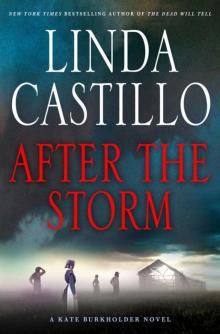 After the Storm
After the Storm A Baby Before Dawn
A Baby Before Dawn Breaking Silence
Breaking Silence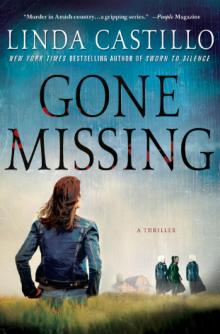 Gone Missing
Gone Missing Long Lost
Long Lost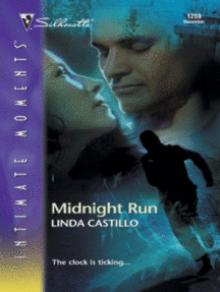 Midnight Run
Midnight Run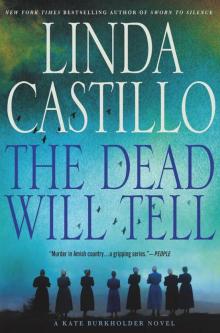 The Dead Will Tell
The Dead Will Tell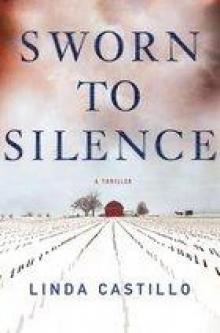 Sworn to Silence
Sworn to Silence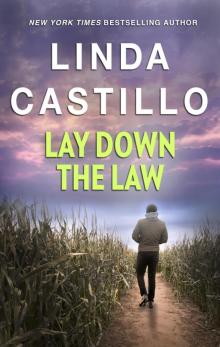 Lay Down the Law
Lay Down the Law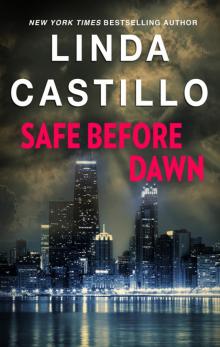 Safe Before Dawn
Safe Before Dawn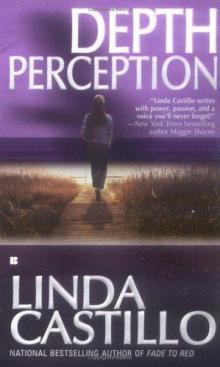 Depth Perception
Depth Perception Seeds of Deception
Seeds of Deception Operation: Midnight Guardian
Operation: Midnight Guardian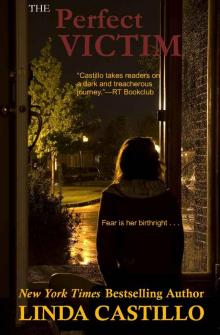 The Perfect Victim
The Perfect Victim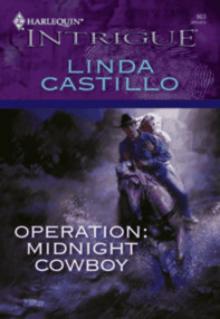 Operation: Midnight Tango
Operation: Midnight Tango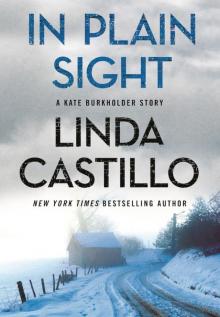 In Plain Sight (Kate Burkholder)
In Plain Sight (Kate Burkholder) Shamed
Shamed Fallen
Fallen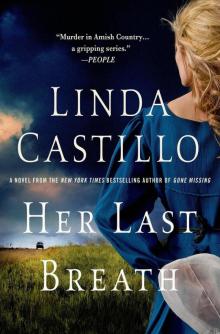 Her Last Breath
Her Last Breath Remember the Night (Men in Blue)
Remember the Night (Men in Blue) Dead Reckoning
Dead Reckoning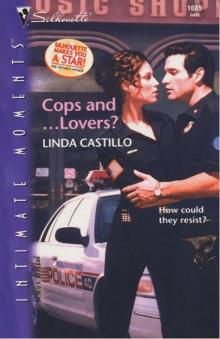 Cops and ... Lovers?
Cops and ... Lovers? The Pact
The Pact A Simple Murder
A Simple Murder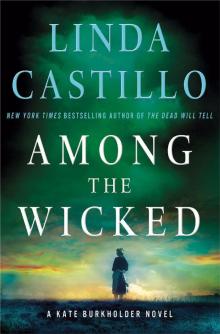 Among the Wicked
Among the Wicked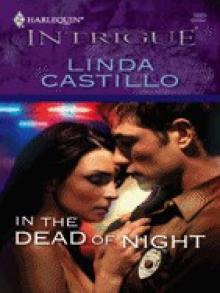 In the Dead of Night
In the Dead of Night Just a Little Bit Dangerous
Just a Little Bit Dangerous The Phoenix Encounter
The Phoenix Encounter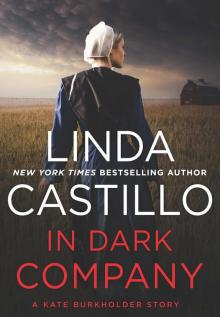 In Dark Company
In Dark Company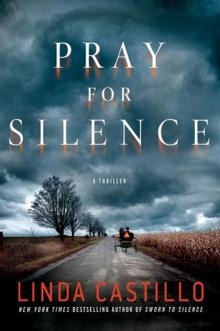 Pray for Silence
Pray for Silence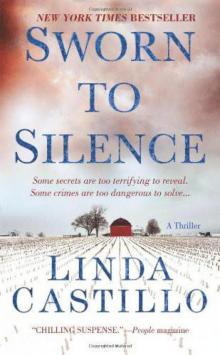 Kate Burkholder 01-Sworn to Silence
Kate Burkholder 01-Sworn to Silence Remember the Night
Remember the Night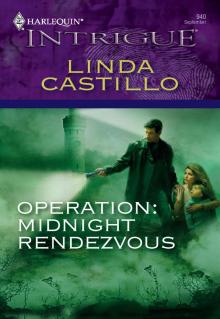 Operation: Midnight Rendezvous
Operation: Midnight Rendezvous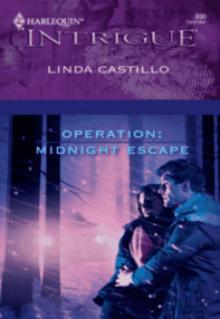 Operation: Midnight Escape
Operation: Midnight Escape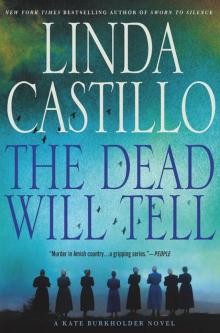 The Dead Will Tell: A Kate Burkholder Novel
The Dead Will Tell: A Kate Burkholder Novel Seeds of Deception: A Kate Burkholder Short Story
Seeds of Deception: A Kate Burkholder Short Story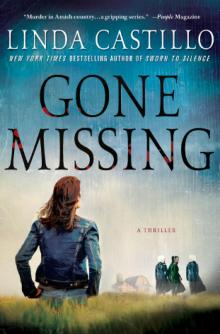 Gone Missing (Kate Burkholder 4) kb-4
Gone Missing (Kate Burkholder 4) kb-4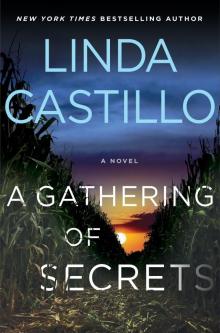 A Gathering of Secrets
A Gathering of Secrets Seeds of Deception: A Kate Burkholder Short Story (Kindle Single)
Seeds of Deception: A Kate Burkholder Short Story (Kindle Single)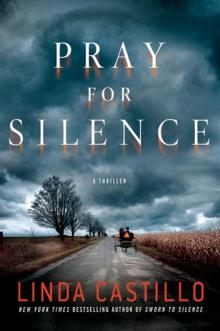 Pray for Silence kb-2
Pray for Silence kb-2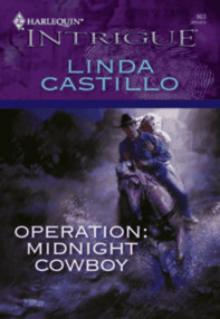 Operation: Midnight Cowboy
Operation: Midnight Cowboy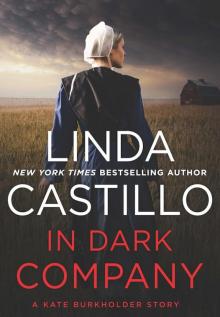 In Dark Company_A Kate Burkholder Short Mystery
In Dark Company_A Kate Burkholder Short Mystery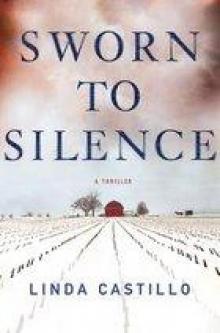 Sworn to Silence kb-1
Sworn to Silence kb-1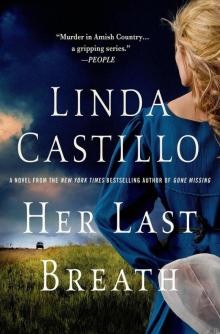 Her Last Breath: A Kate Burkholder Novel
Her Last Breath: A Kate Burkholder Novel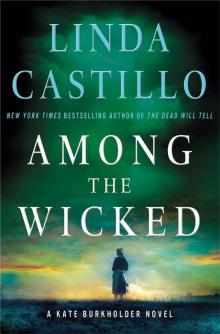 Among the Wicked: A Kate Burkholder Novel
Among the Wicked: A Kate Burkholder Novel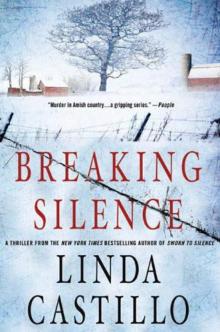 Breaking Silence kb-3
Breaking Silence kb-3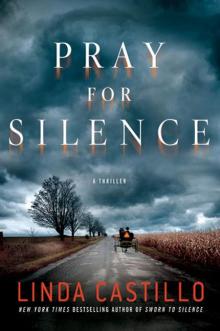 Kate Burkholder 2 - Pray for Silence
Kate Burkholder 2 - Pray for Silence Long Lost: A Kate Burkholder Short Story
Long Lost: A Kate Burkholder Short Story